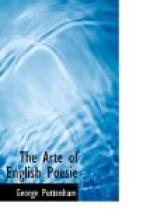or stages of timber, shadowed with linen or lether
as the other, and these stages were made in the forme
of a
Semicircle, wherof the bow serued for the
beholders to fit in, and the string or forepart was
appointed for the floore or place where the players
vttered, & had in it sundry little diuisions by curteins
as trauerses to serue for seueral roomes where they
might repaire vnto & change their garments & come in
againe, as their speaches & parts were to be renewed.
Also there was place appointed for the musiciens to
sing or to play vpon their instrumentes at the end
of euery scene, to the intent the people might be
refreshed, and kept occupied. This maner of stage
in halfe circle, the Greekes called
theatrum,
as much to say as a beholding place, which was also
in such sort contriued by benches and greeces to stand
or sit vpon; as no man should empeach anothers sight.
But as ciuilitie and withall wealth encreased, so
did the minde of man growe dayly more haultie and
superfluous in all his deuises, so as for their
theaters
in halfe circle, they came to be by the great magnificence
of the Romain princes and people somptuously built
with marble & square stone in forme all round, & were
called
Amphitheaters, wherof as yet appears
one among the ancient ruines of Rome, built by
Pompeius
Magnus, for capasitie able to receiue at ease
fourscore thousand persons as it is left written, &
so curiously contriued as euery man might depart at
his pleasure, without any annoyance to other.
It is also to be knowne that in those great
Amphitheaters,
were exhibited all maner of other shewes & disports
for the people, as their ferce playes, or digladiations
of naked men, their wrastlings, runnings leapings
and other practises of actiuitie and strength, also
their baitings of wild beasts, as Elephants, Rhinocerons,
Tigers, Leopards and others, which sights much delighted
the common people, and therefore the places required
to be large and of great content.
CHAP. XVIII.
Of the Shepheards or pastorall Poesie called Eglogue,
and to what purpose it was first inuented and vsed.
Some be of opinion, and the chiefe of those who haue
written in this Art among the Latines, that the pastorall
Poesie which we commonly call by the name of Eglogue
and Bucolick, a tearme brought in by the Sicilian
Poets, should be the first of any other, and before
the Satyre comedie or tragedie, because, say
they, the shepheards and haywards assemblies & meetings
when they kept their cattell and heards in the common
fields and forests, was the first familiar conuersation,
and their babble and talk vnder bushes and shadie
trees, the first disputation and contentious reasoning,
and their fleshly heates growing of ease, the first
idle wooings, and their songs made to their mates
or paramours either vpon sorrow or iolity of courage,
the first amorous musicks, sometime also they sang
and played on their pipes for wagers, striuing who




